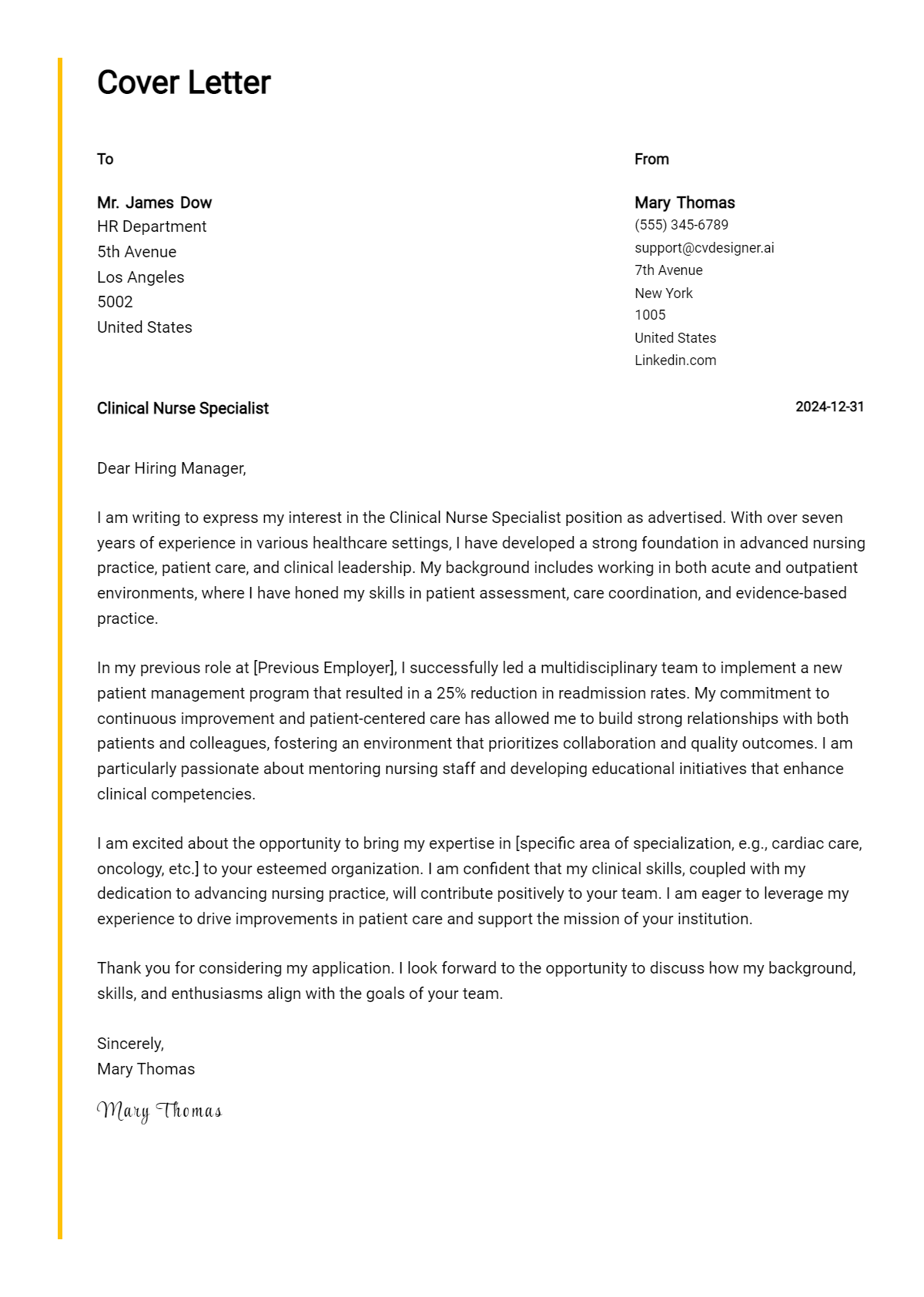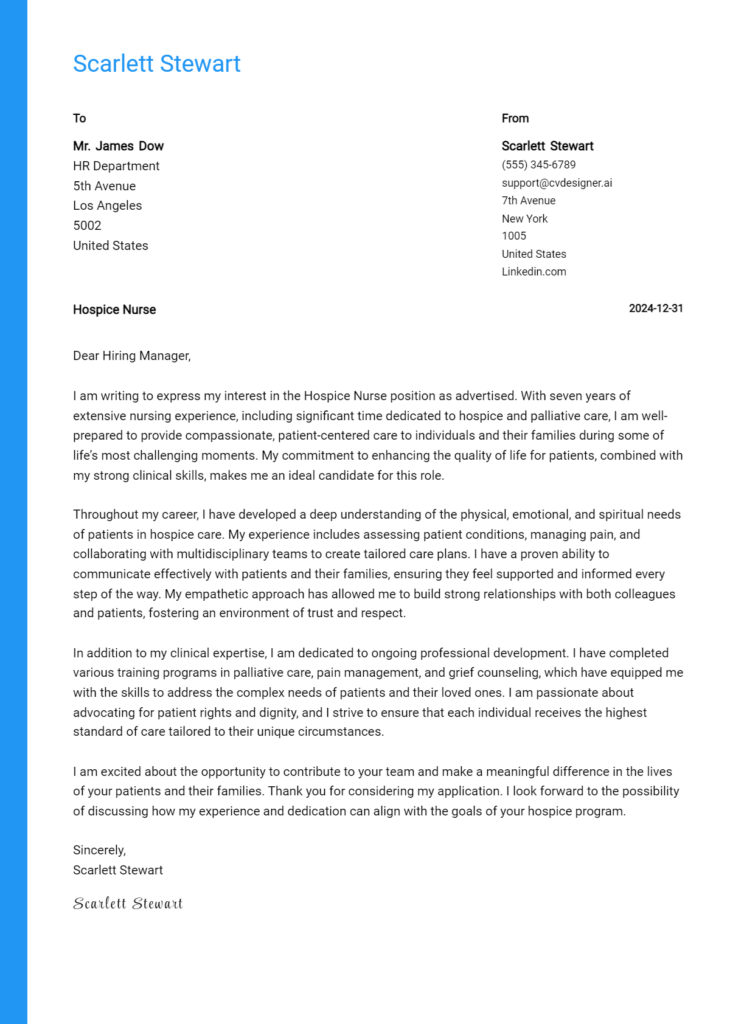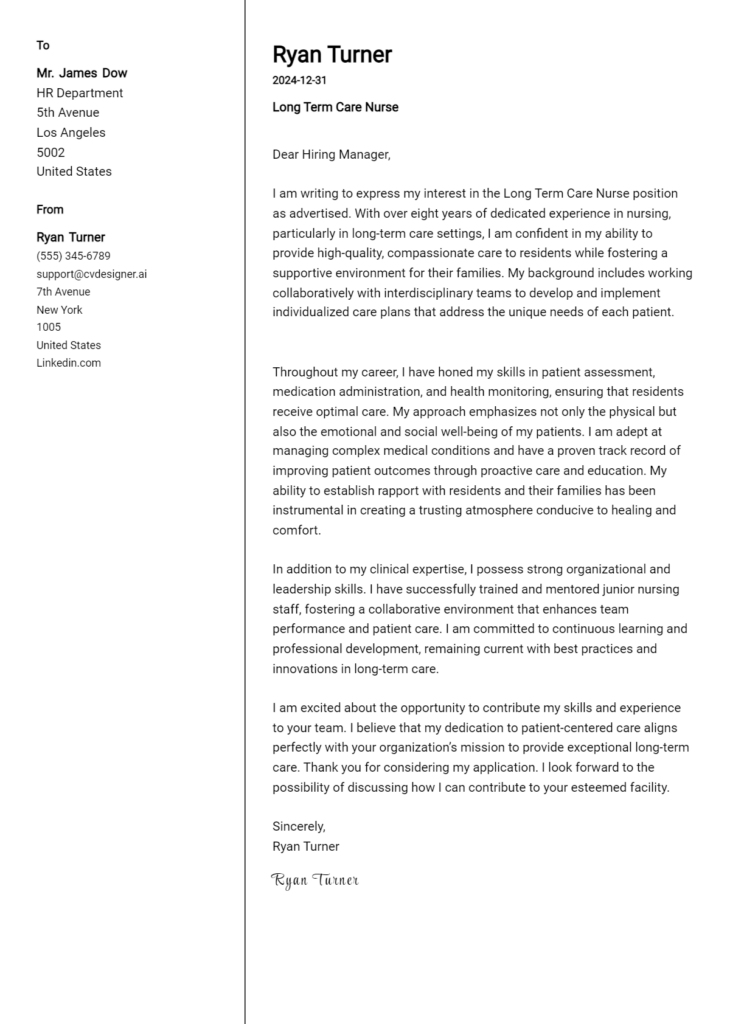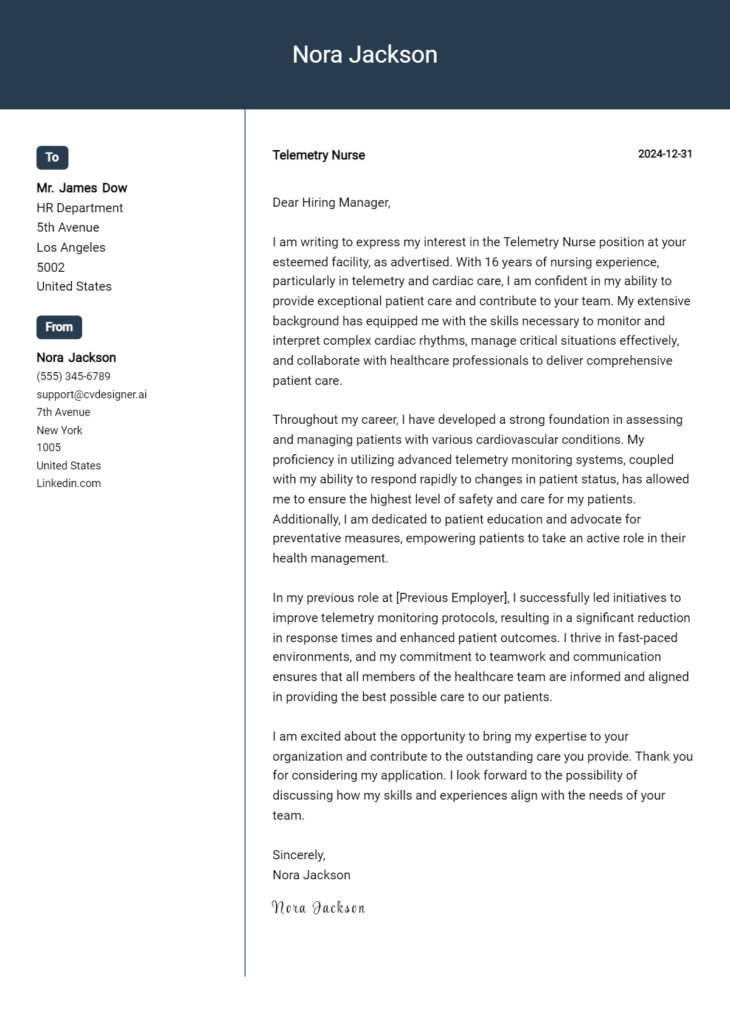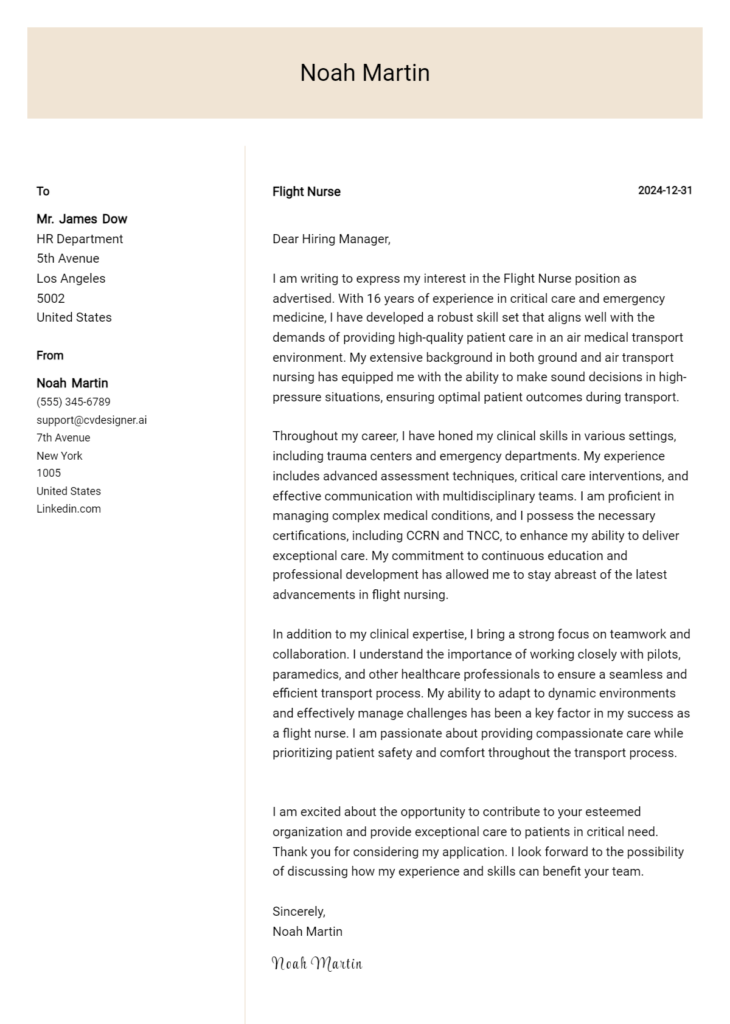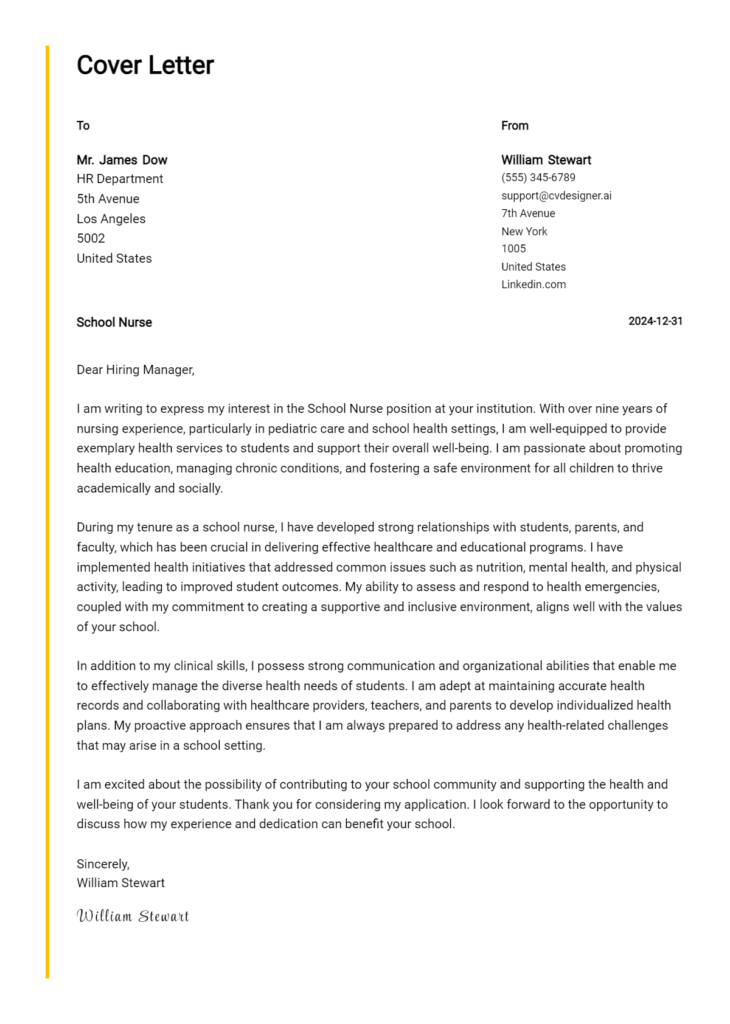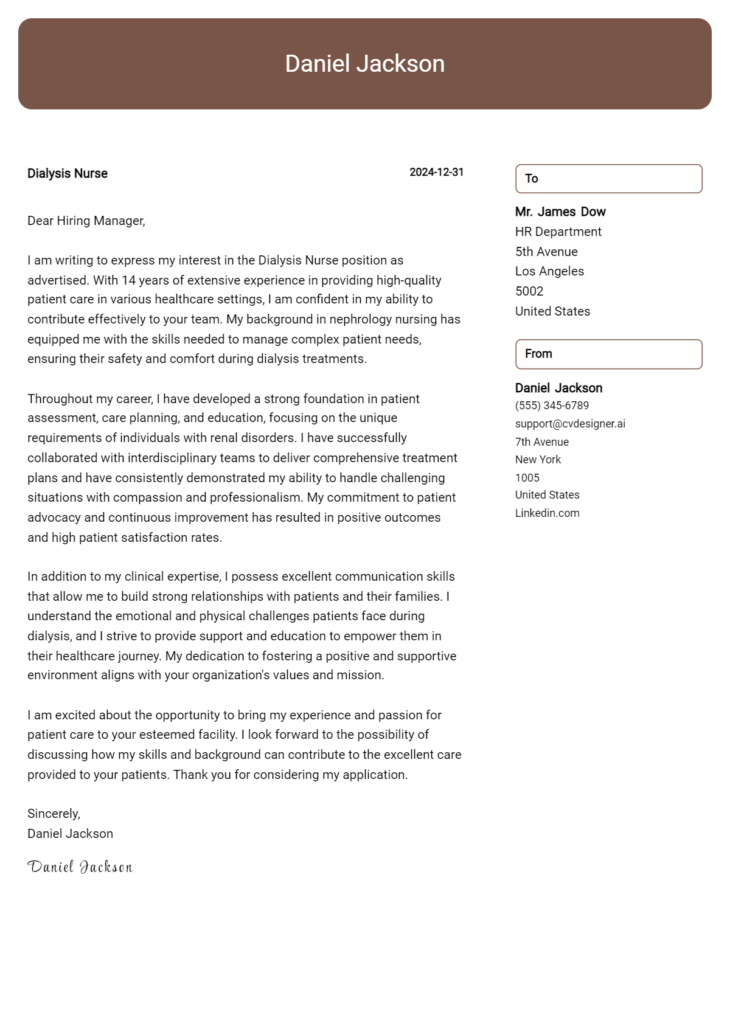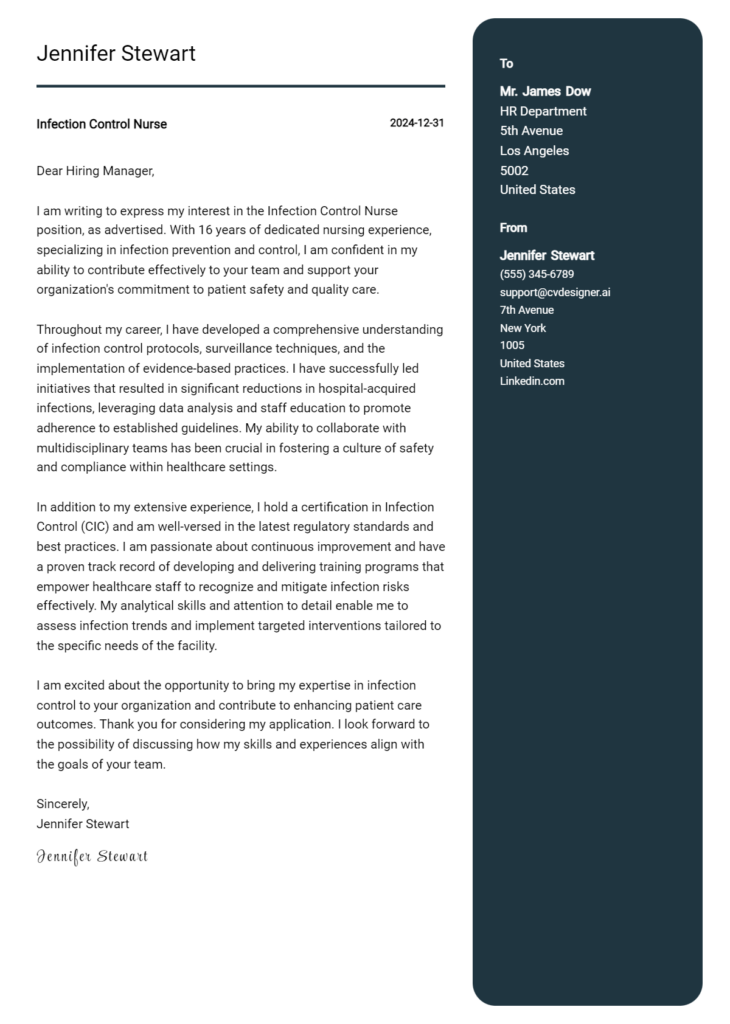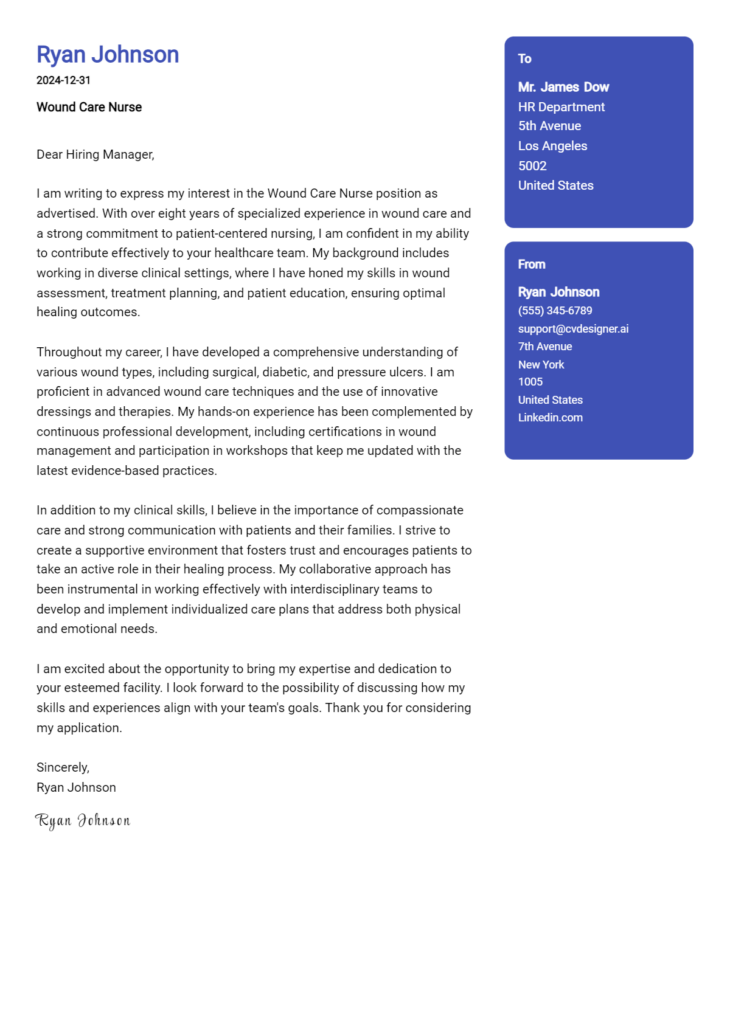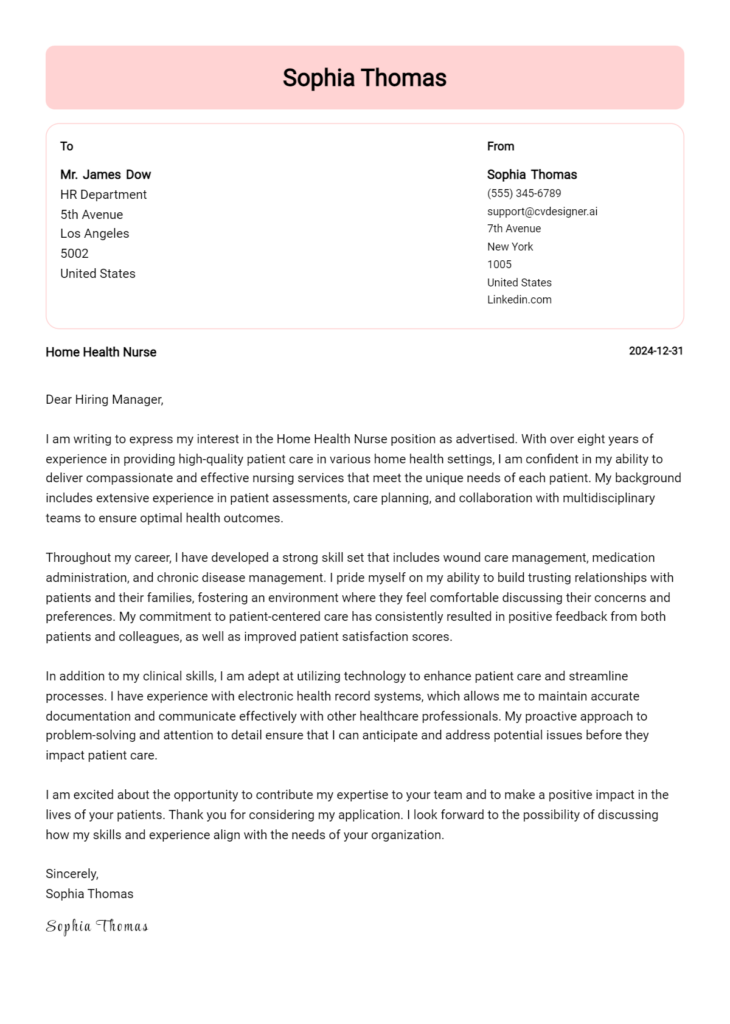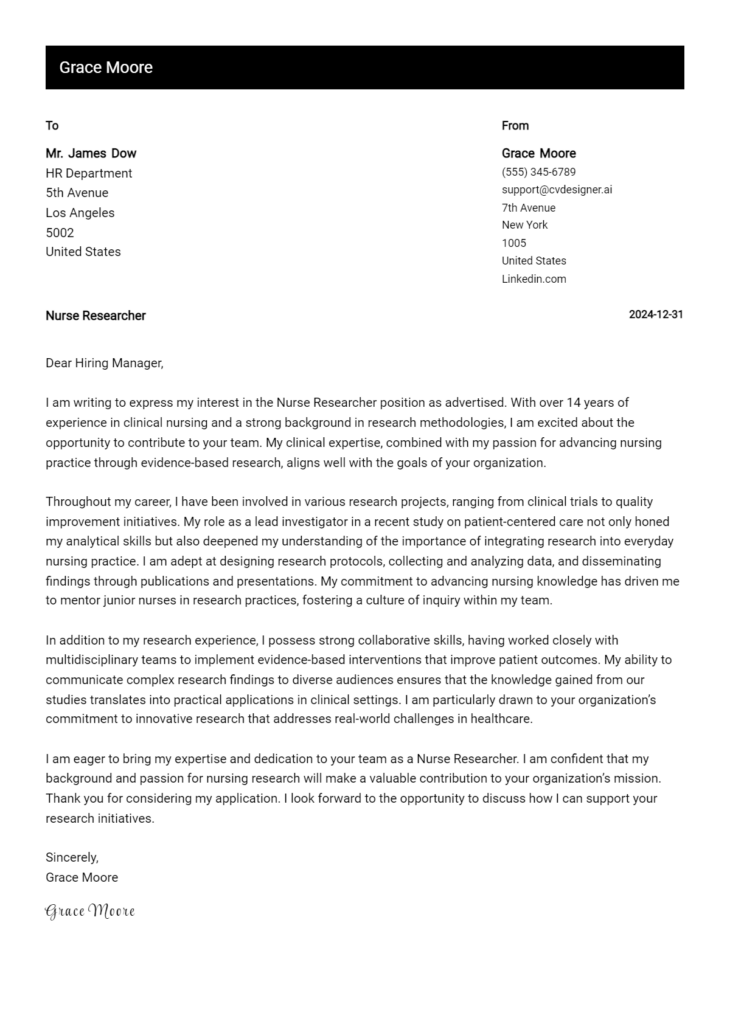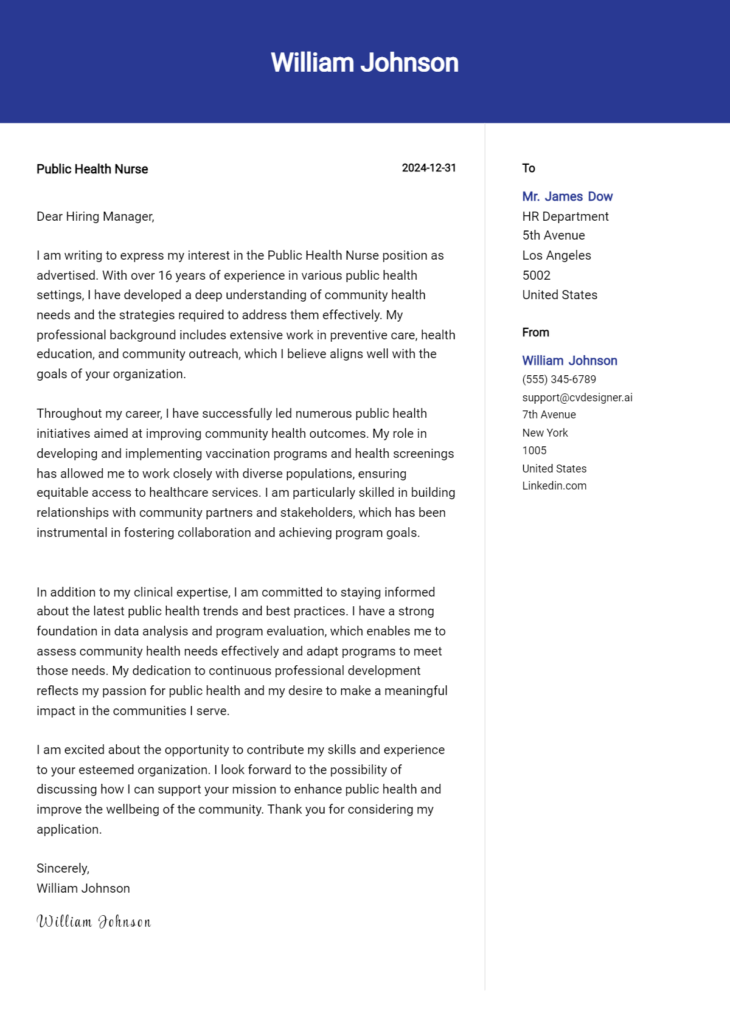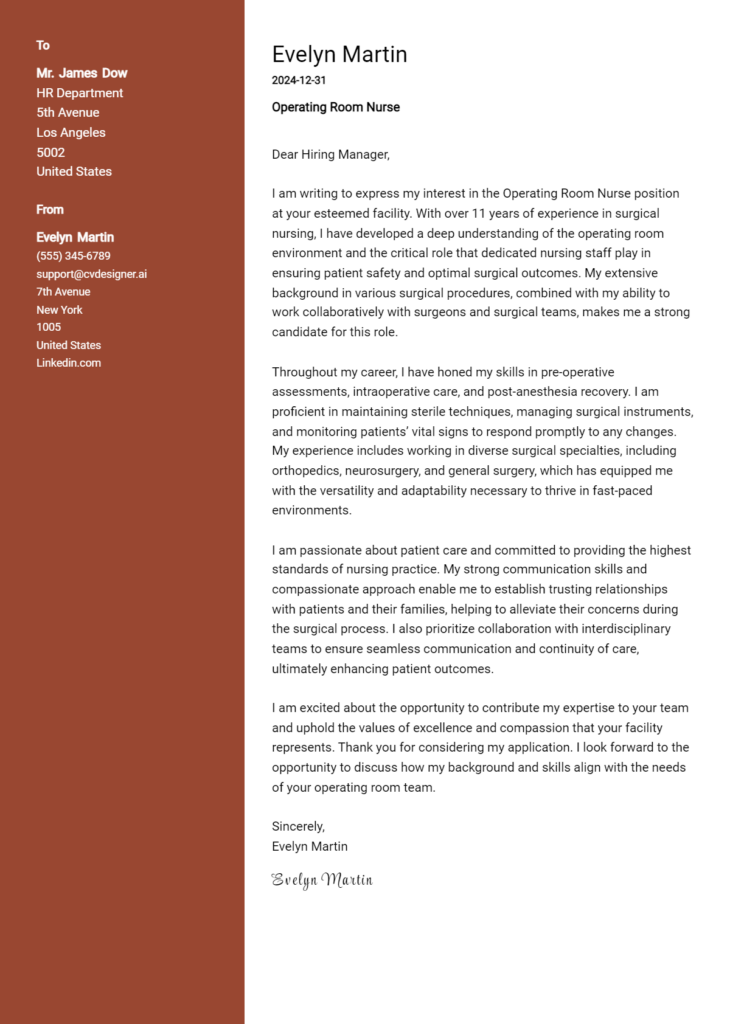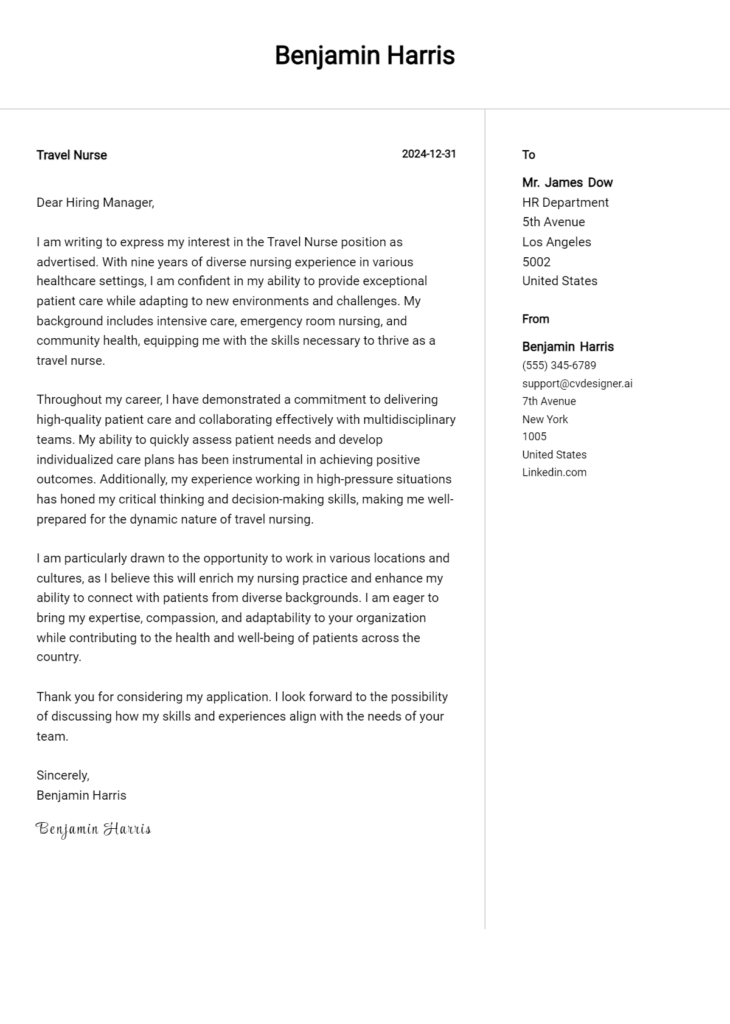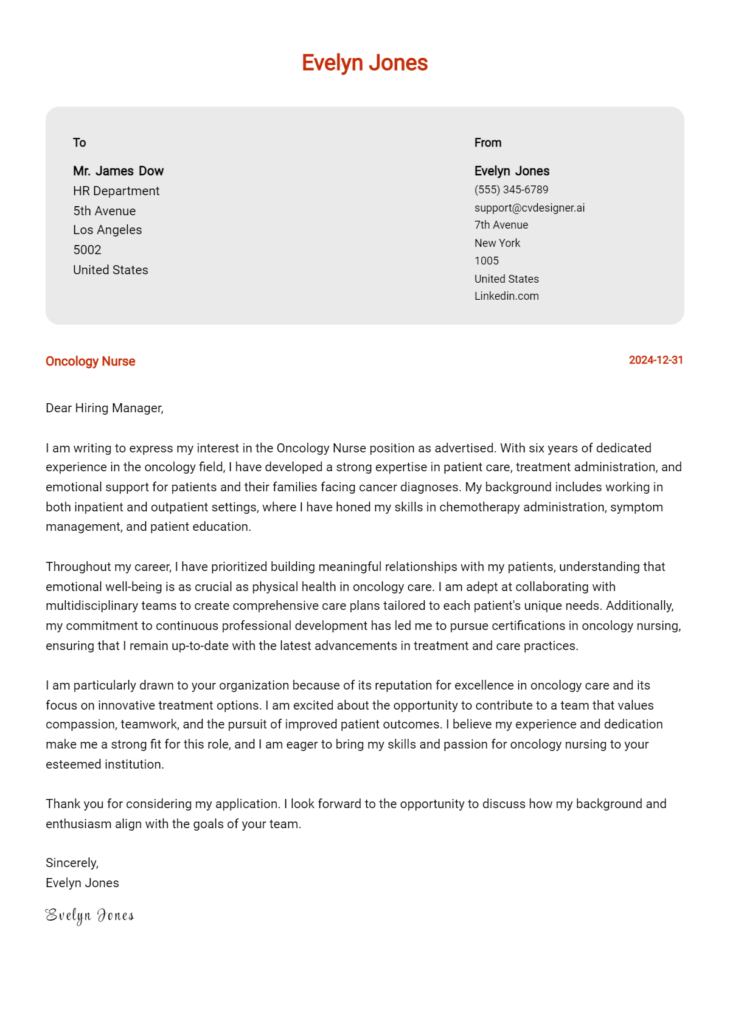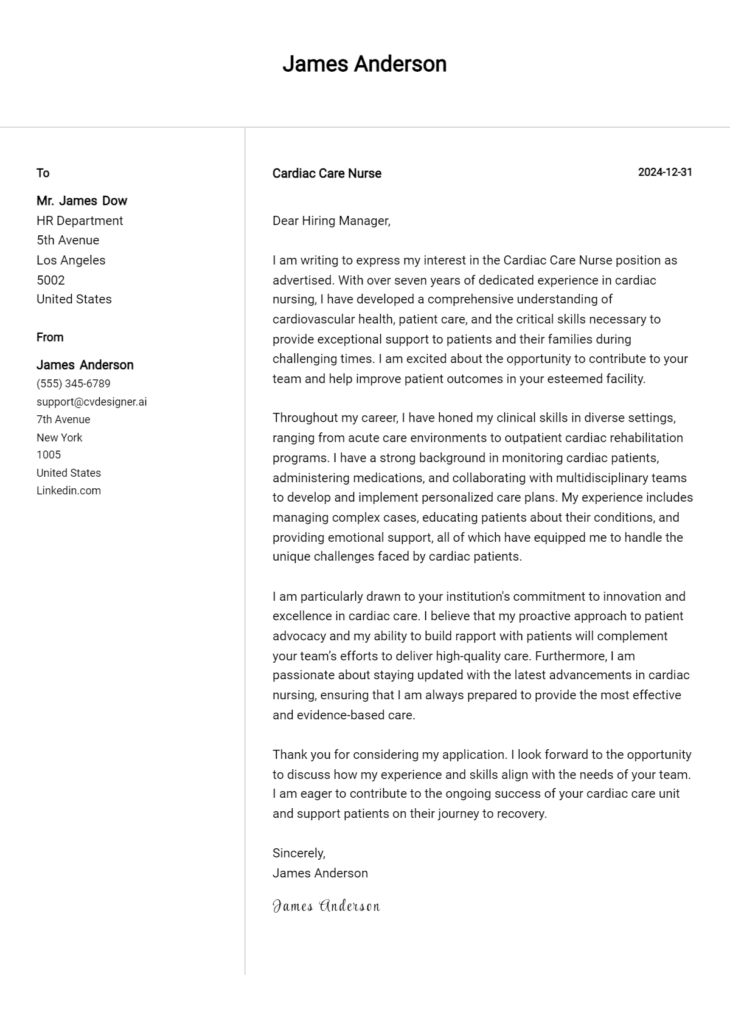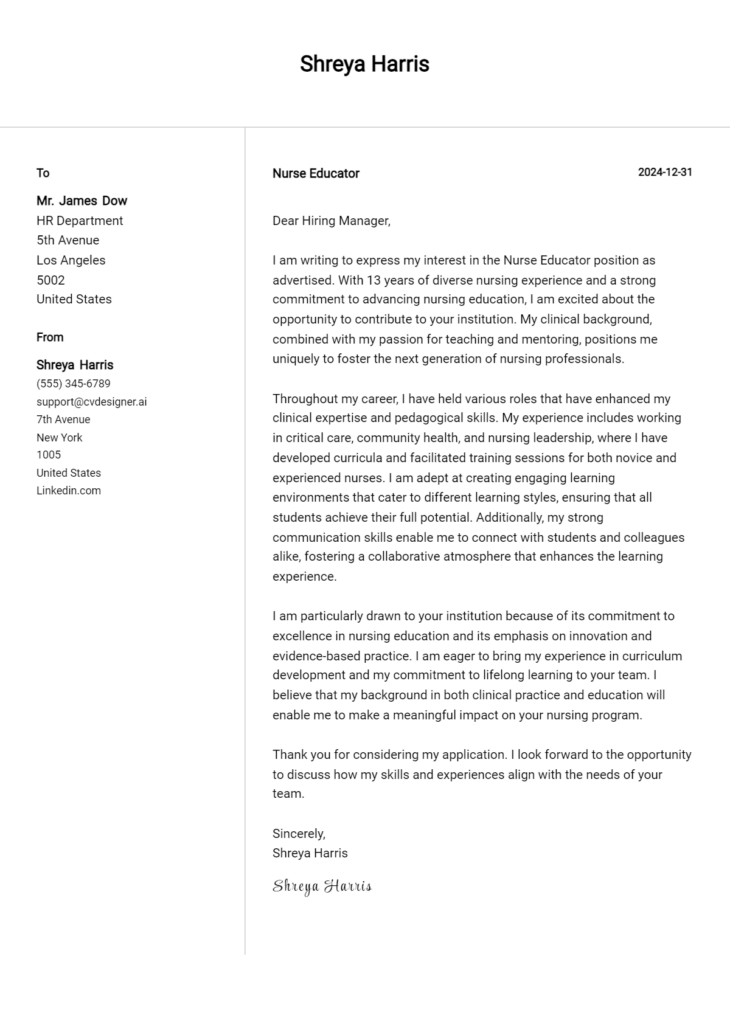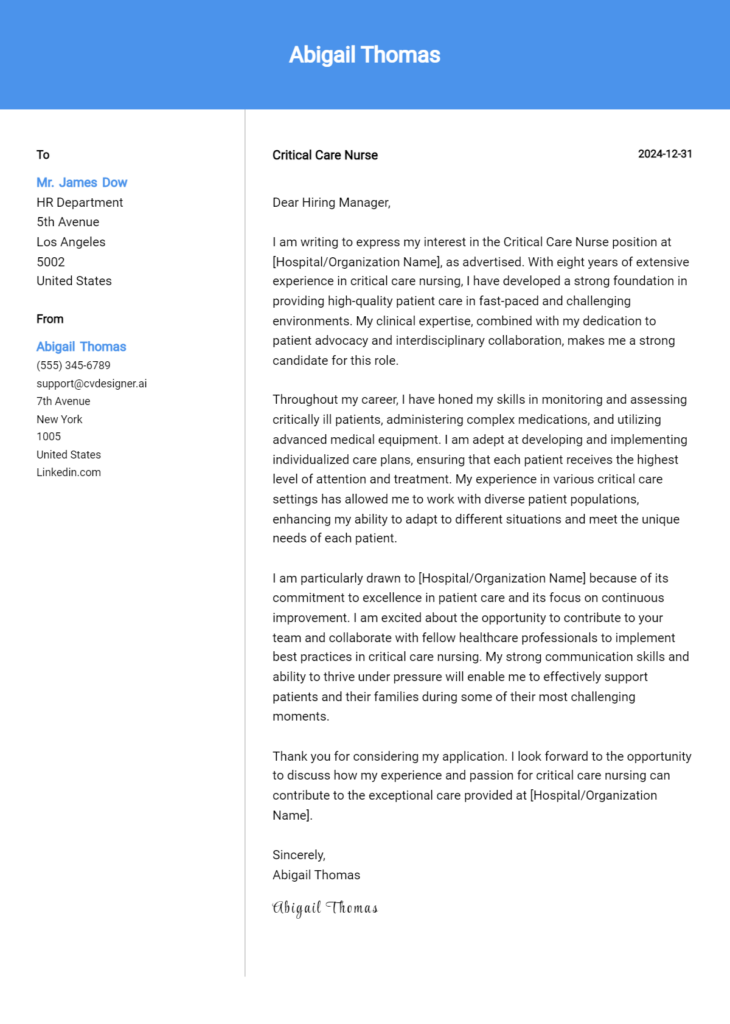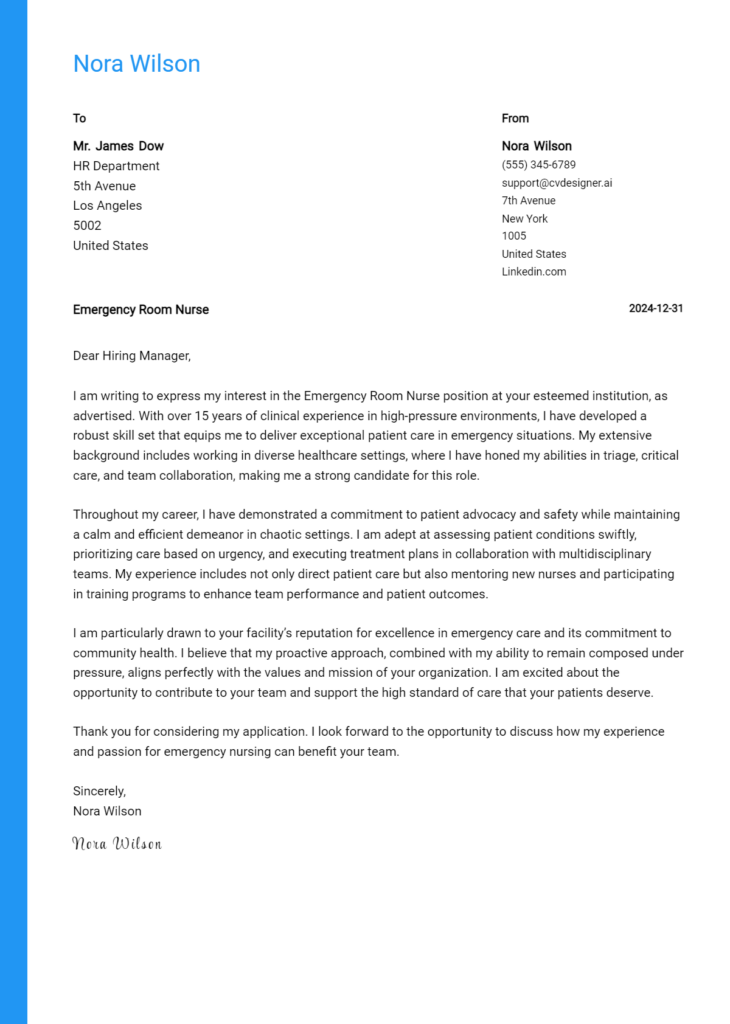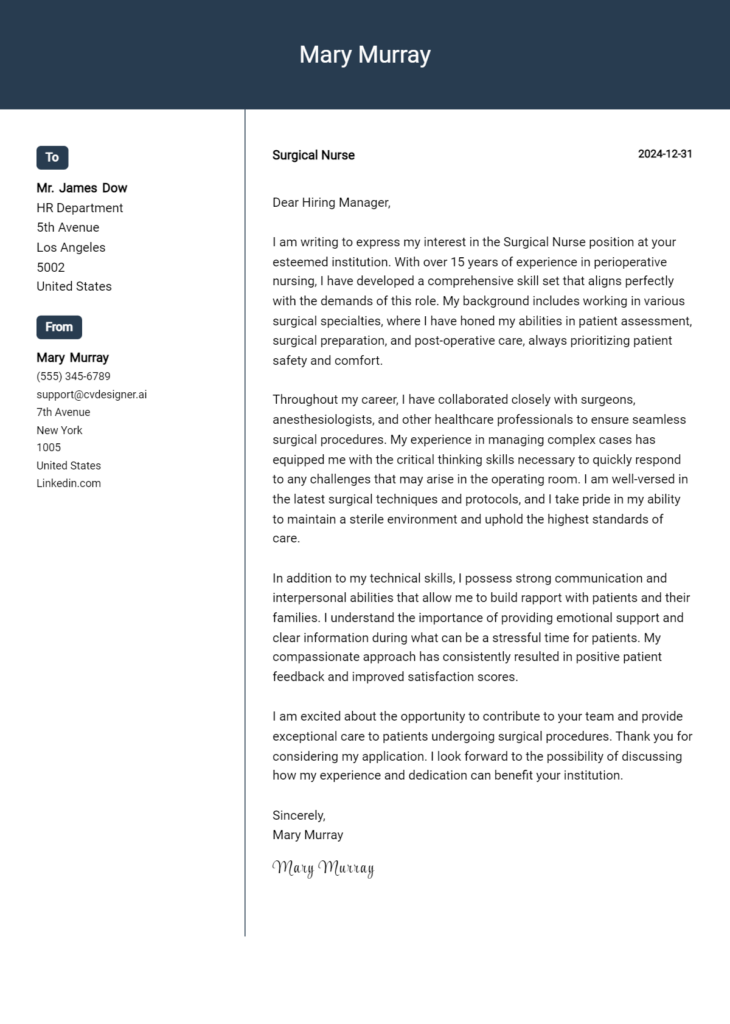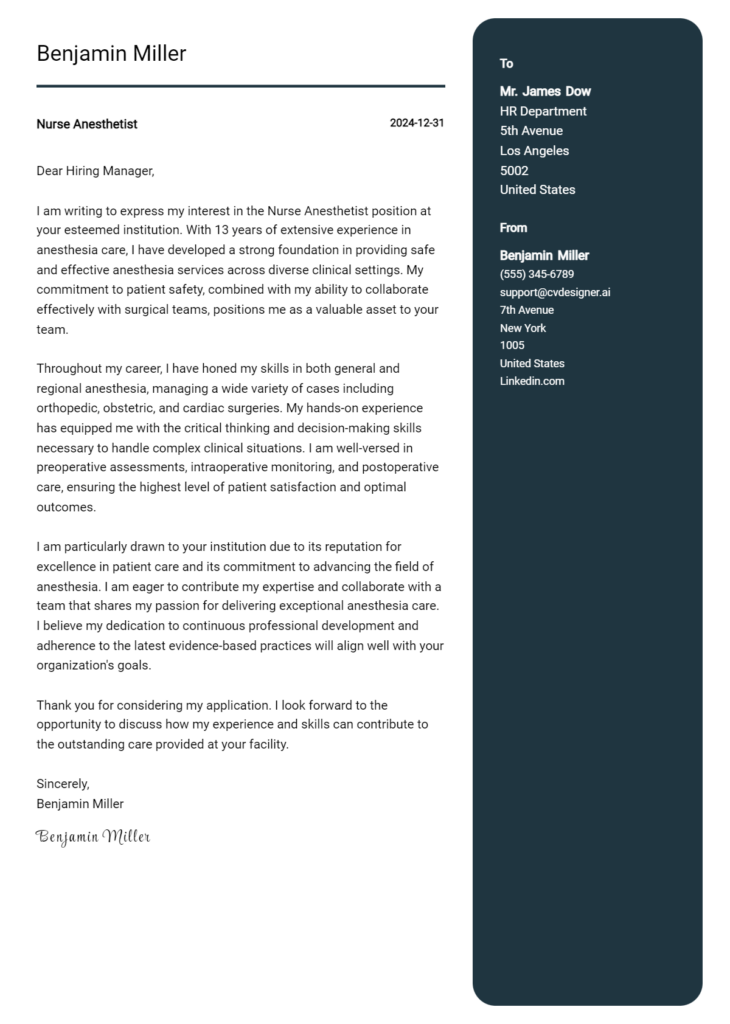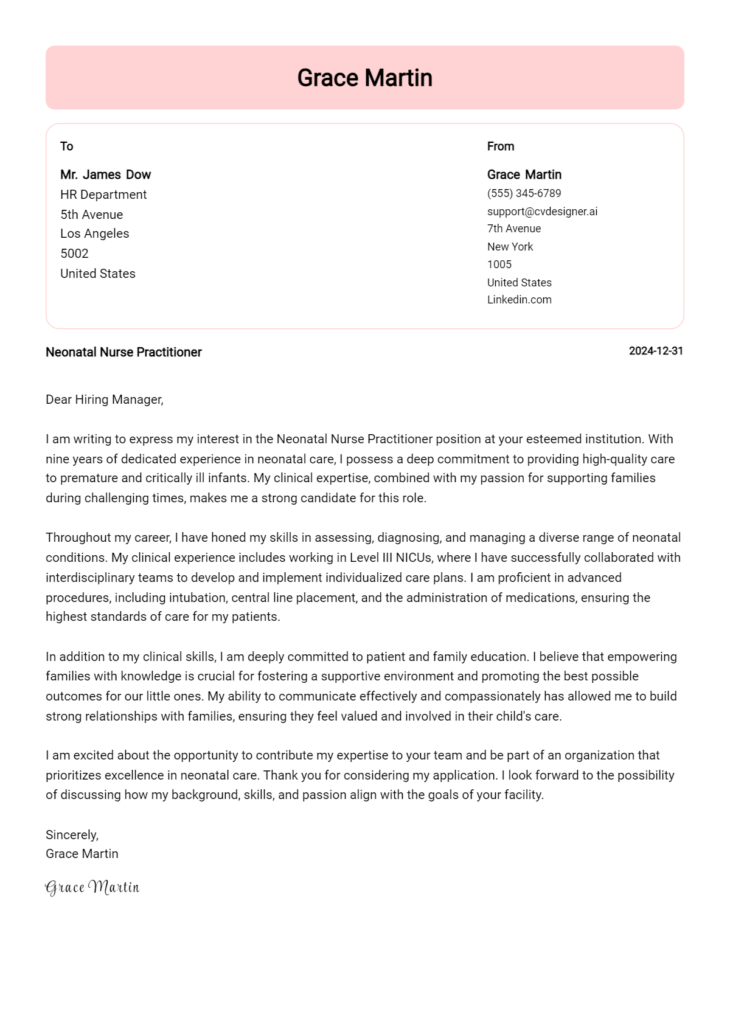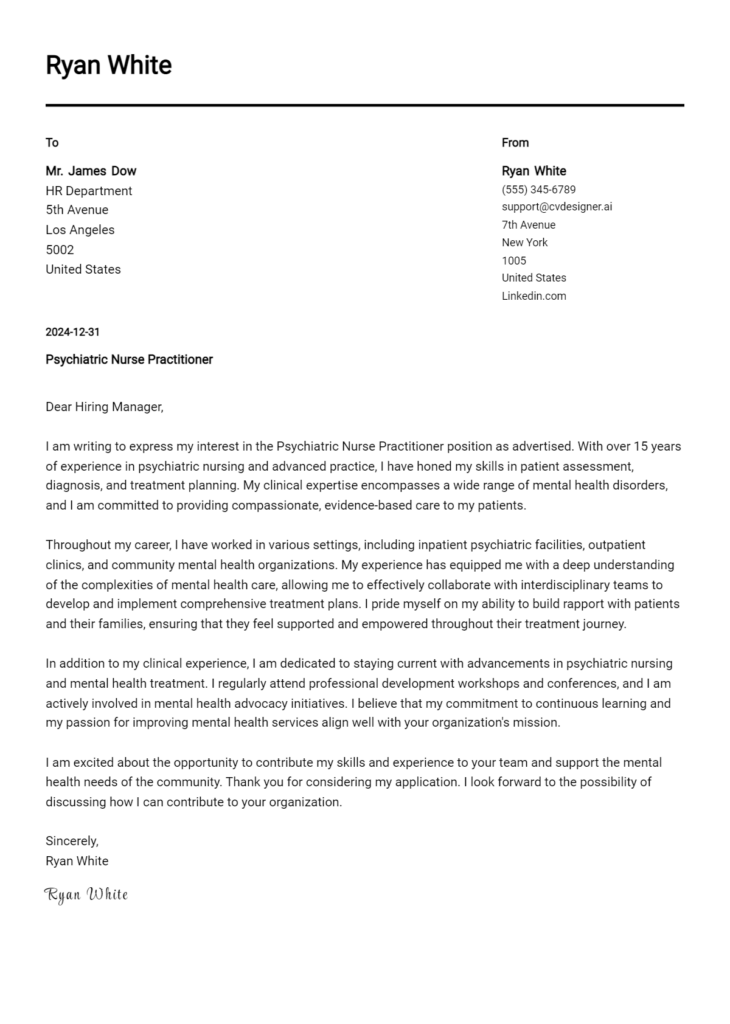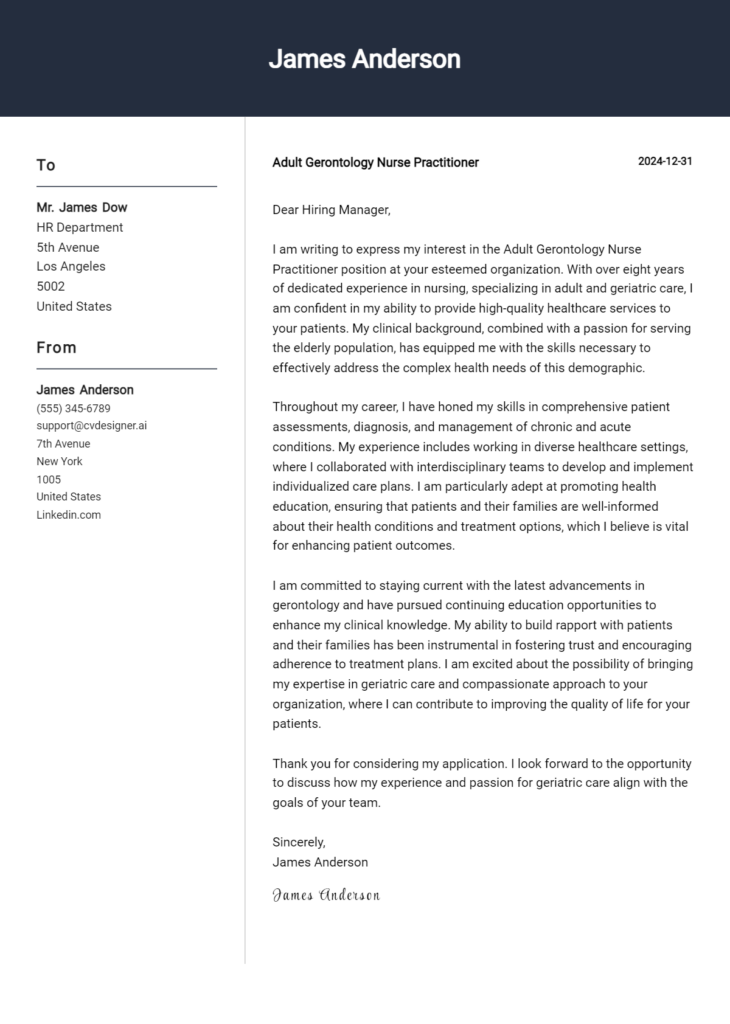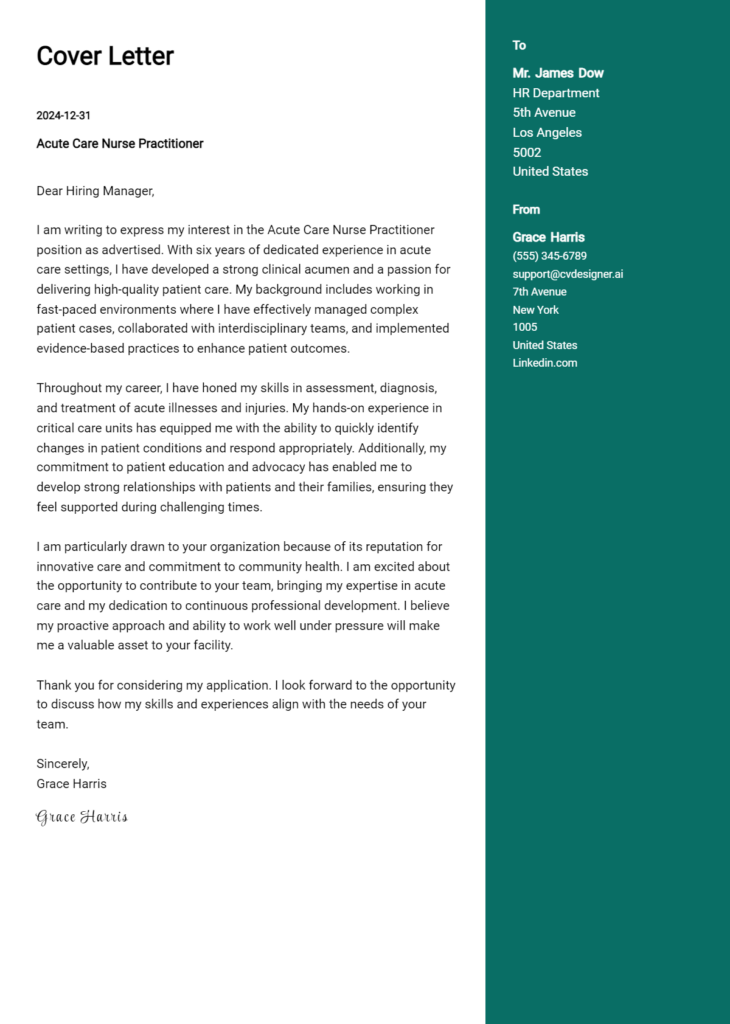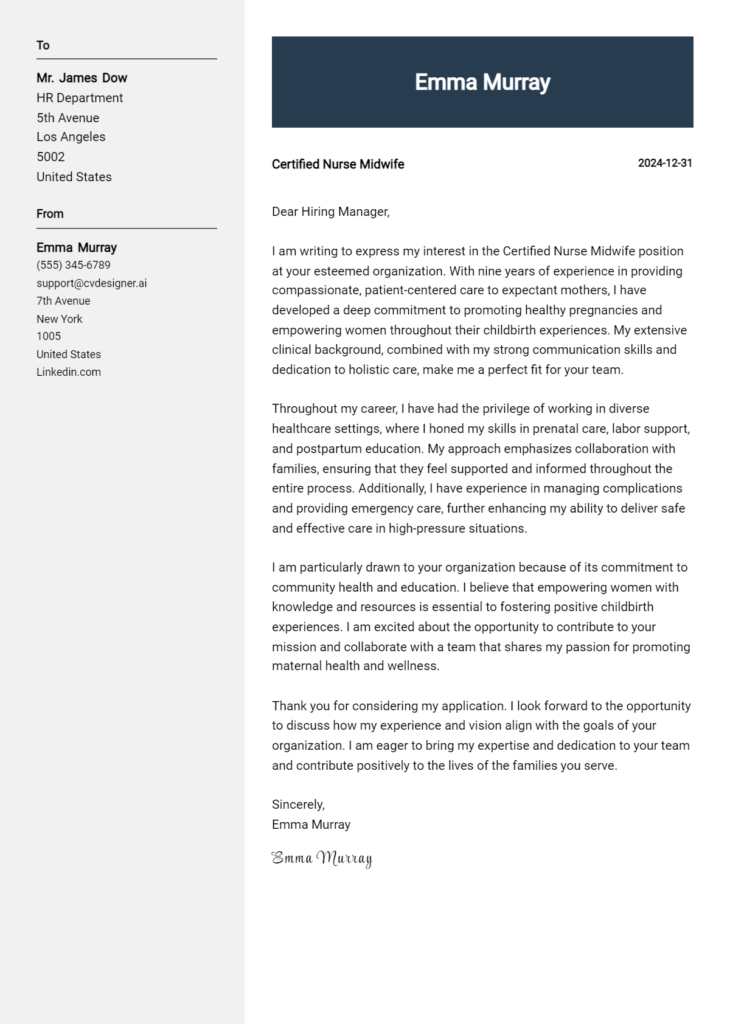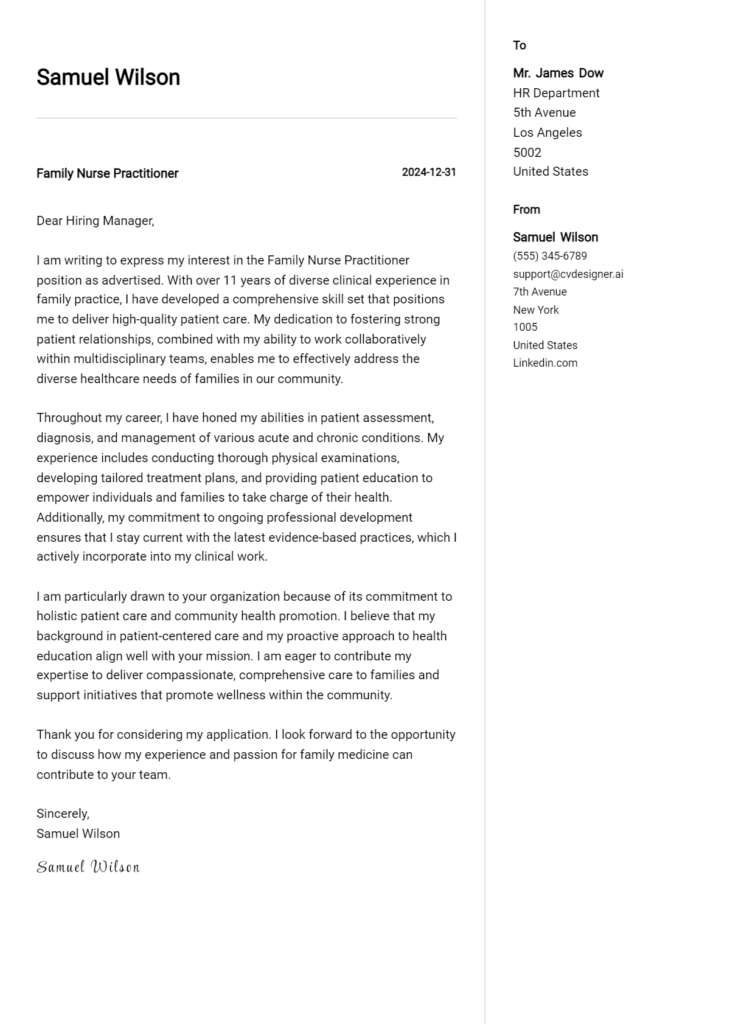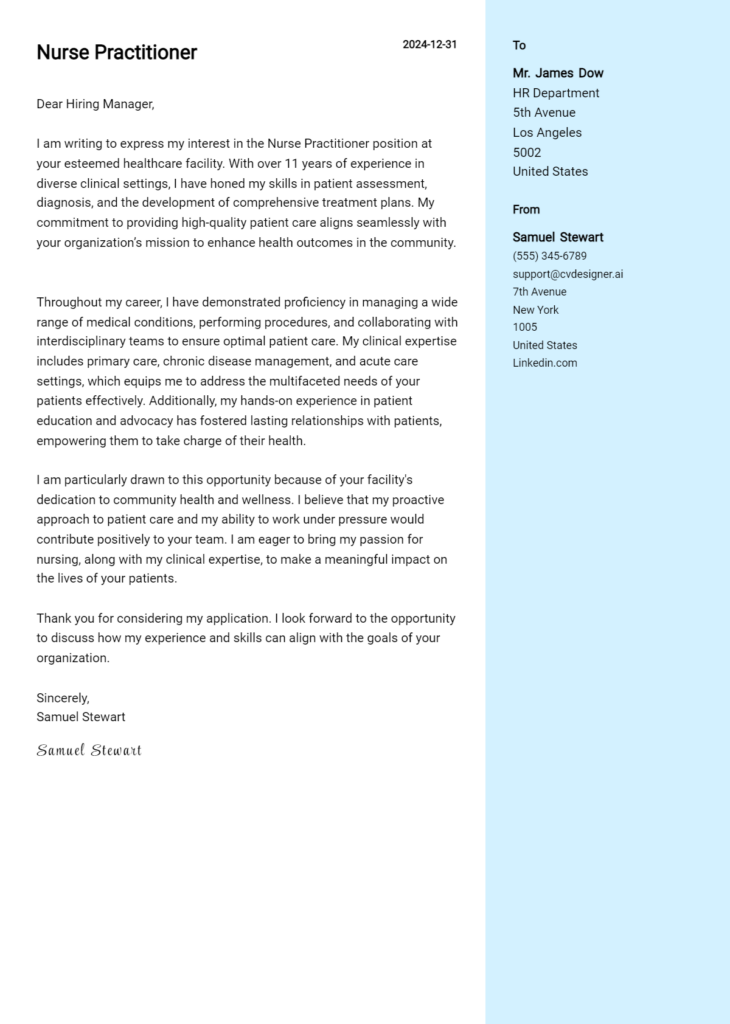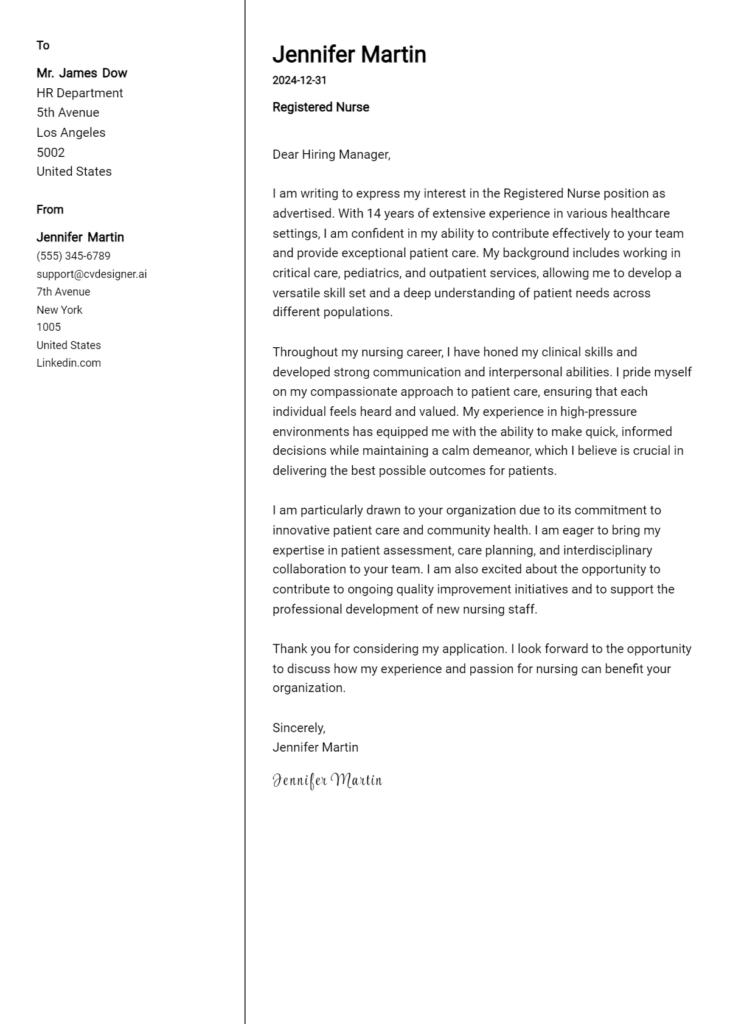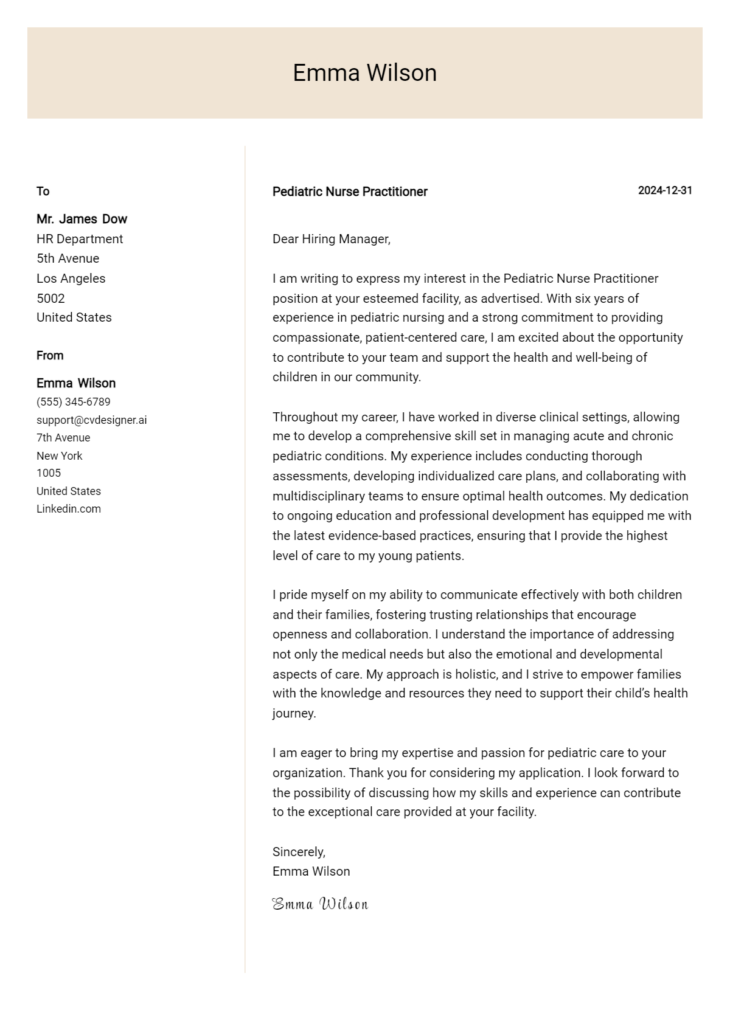Clinical Nurse Specialist Cover Letter Examples
Explore additional Clinical Nurse Specialist cover letter samples and guides and see what works for your level of experience or role.
How to Format a Clinical Nurse Specialist Cover Letter
Crafting a compelling cover letter is crucial for a Clinical Nurse Specialist, as it serves as your first opportunity to make a lasting impression on potential employers. Proper formatting not only demonstrates your professionalism but also showcases your ability to communicate effectively—a vital skill in nursing. A well-structured cover letter invites the hiring manager to delve deeper into your qualifications and experience, reflecting your commitment to patient care and clinical excellence.
In this guide, we’ll explore how to format your cover letter, providing insights and examples tailored for Clinical Nurse Specialists to help your application stand out.
We will focus on the essential components of a professional cover letter, including:
- Cover Letter Header
- Cover Letter Greeting
- Cover Letter Introduction
- Cover Letter Body
- Cover Letter Closing
Each section plays a significant role in emphasizing your qualifications and dedication to the nursing profession. Let’s break down each part and explain how to create an impactful cover letter that resonates with hiring managers.
Importance of the Cover Letter Header for a Clinical Nurse Specialist
A well-structured cover letter header is crucial for a Clinical Nurse Specialist as it sets the tone for the entire document and conveys professionalism. The header should include essential contact information, the date, and the recipient's details to ensure clarity and facilitate communication. A clear header not only makes it easy for hiring managers to identify who you are but also adds to the overall presentation of your application. A strong header enhances your first impression, while a weak one can detract from your qualifications and professionalism.
Strong Example
Jane Doe, RN, MSN, CNS 123 Main Street Cityville, ST 12345 janedoe@email.com (123) 456-7890 October 1, 2023 Hiring Manager Healthcare Facility Name 456 Health Lane Cityville, ST 12345
Weak Example
Jane D. No. 123 Cityville 1/10/23 To Whom It May Concern Someplace Street Address
The Importance of a Cover Letter Greeting
The greeting of your cover letter is crucial in establishing the tone for the rest of your application. It sets the stage for your professionalism and shows that you have taken the time to personalize your communication. By addressing the hiring manager directly, you demonstrate respect and a genuine interest in the position, which can leave a positive impression right from the start. To avoid generic greetings, it's important to research the recipient's name and title, which can often be found on the company website or through professional networking sites. This small effort can significantly enhance your cover letter's impact.
Strong Example
Dear Ms. Johnson,
Weak Example
To Whom It May Concern,
Cover Letter Introduction for Clinical Nurse Specialist
A well-crafted cover letter introduction is crucial for a Clinical Nurse Specialist position as it serves as the first impression to the hiring manager. This introduction should not only capture attention but also convey the candidate's enthusiasm for the role and emphasize their relevant skills or notable achievements. A compelling introduction sets the tone for the rest of the cover letter and can significantly influence the hiring manager's perception of the candidate. Below are examples of strong and weak introductions for a Clinical Nurse Specialist cover letter.
Strong Example
Dear [Hiring Manager's Name], I am excited to apply for the Clinical Nurse Specialist position at [Hospital Name], where I can leverage my 10 years of experience in critical care nursing and my passion for patient advocacy. My proven track record in implementing evidence-based practices has led to a 25% reduction in patient complications in my current role, and I am eager to bring this dedication and expertise to your team.
Weak Example
To whom it may concern, I am writing to apply for the Clinical Nurse Specialist position. I have worked in nursing for several years, and I think I could do a good job. I have some experience with patients and various duties.
Purpose of the Cover Letter Body for a Clinical Nurse Specialist
The cover letter body for a Clinical Nurse Specialist serves as a critical showcase of the candidate's unique skills, relevant experiences, and the value they can bring to the healthcare organization. This section allows candidates to highlight specific projects or accomplishments that demonstrate their expertise in patient care, clinical leadership, and evidence-based practice. By articulating their professional journey and contributions, candidates can effectively communicate how their background aligns with the institution's goals, ultimately persuading hiring managers of their suitability for the role.
Strong Example
As a Clinical Nurse Specialist with over five years of experience in cardiology, I successfully led a multidisciplinary team in a quality improvement project that reduced patient readmission rates by 30% within one year. By implementing evidence-based protocols and providing educational sessions for nursing staff, we enhanced patient understanding and adherence to treatment plans. My commitment to continuous improvement and patient advocacy has also been recognized through the 'Excellence in Nursing' award at my current facility, affirming my ability to deliver high-quality care while fostering a collaborative environment. I am eager to bring my expertise in advanced clinical practice and patient-centered care to your esteemed organization.
Weak Example
I have worked as a nurse for several years and have some experience in different areas of healthcare. I think I would be a good fit for the Clinical Nurse Specialist position because I like helping patients and working with teams. I have done some training and have participated in a few projects, but I don't have specific examples to mention. I hope to make a positive impact at your organization.
Importance of Cover Letter Closing for a Clinical Nurse Specialist
The closing paragraph of a cover letter is crucial for a Clinical Nurse Specialist as it serves to summarize the candidate's qualifications, reinforce their enthusiasm for the position, and encourage the hiring manager to take the next step, such as reviewing the resume or scheduling an interview. A strong closing leaves a lasting impression, highlighting the candidate's professionalism and commitment to the role, while a weak closing can diminish the impact of the entire application.
Strong Example
Thank you for considering my application for the Clinical Nurse Specialist position. With my extensive experience in patient care, advanced clinical skills, and dedication to improving patient outcomes, I am excited about the opportunity to contribute to your team. I am eager to discuss how my background and passion for nursing align with the goals of your organization. I look forward to the possibility of discussing my application further and hope to schedule an interview soon. Thank you for your time and consideration.
Weak Example
I hope you look at my resume. I think I would be good for the Clinical Nurse Specialist job. Let me know if you want to talk. Thanks.
Crafting an effective cover letter for a Clinical Nurse Specialist position is crucial for standing out in a competitive job market. This letter should not only highlight your clinical expertise but also demonstrate your problem-solving abilities, knowledge of the software development life cycle (SDLC), teamwork skills, and a commitment to continuous learning. Here are some essential tips to help you create a compelling cover letter that showcases your qualifications and enthusiasm for this vital role.
Tips for Writing an Effective Cover Letter
Showcase Your Technical Skills
In your cover letter, explicitly mention your clinical competencies and any specialized training you have received. Highlight certifications, such as CCRN or ACNP, and detail your experience with advanced medical technologies that are relevant to the role. This will demonstrate your readiness to handle the technical demands of a Clinical Nurse Specialist.Emphasize Problem-Solving Abilities
Provide specific examples of how you have successfully resolved complex patient care issues in the past. Use quantifiable results to illustrate your impact, such as improvements in patient outcomes or efficiency in care delivery. This not only highlights your analytical skills but also your ability to think critically under pressure.Demonstrate SDLC Knowledge
If you have experience with healthcare technology systems or EHR implementations, mention it. Explain how your understanding of the software development life cycle has positively influenced patient care or streamlined processes in your previous roles. This showcases your adaptability and technical proficiency, which are increasingly important in modern healthcare settings.Highlight Teamwork and Collaboration
Describe your experience working within interdisciplinary teams. Provide examples of how you have collaborated with physicians, nurses, and other healthcare professionals to develop care plans or improve service delivery. This not only reflects your ability to work well with others but also emphasizes your commitment to holistic patient care.Express a Passion for Continuous Learning
Convey your dedication to professional development by mentioning relevant courses, workshops, or conferences you've attended. Discuss any ongoing education or certifications you are pursuing. This shows employers that you are proactive about staying current in your field and are committed to enhancing your skills for the benefit of your patients.
By incorporating these tips into your cover letter, you can effectively communicate your qualifications and passion for the Clinical Nurse Specialist role. For additional resources, consider using cover letter templates or a cover letter builder to streamline your writing process and ensure a professional presentation.
Common Mistakes to Avoid in a Clinical Nurse Specialist Cover Letter
Crafting a compelling cover letter is essential for clinching your desired position as a Clinical Nurse Specialist. Avoiding common pitfalls can significantly enhance your chances of making a positive impression. Here are several mistakes to steer clear of:
Generic Greetings: Using a generic salutation like "To Whom It May Concern" can make your application seem impersonal. Instead, research the hiring manager's name to create a personalized touch.
Lack of Specificity: Failing to tailor your letter to the specific role can lead to a missed opportunity. Clearly connect your skills and experiences to the requirements listed in the job description.
Overly Lengthy Content: Cover letters should be concise. Avoid long paragraphs and unnecessary details by focusing on your most relevant qualifications. Aim for a clear format outlined in our cover letter format.
Neglecting to Show Passion: A cover letter is your chance to convey enthusiasm for the role. Avoid a dry tone; instead, express your commitment to nursing and how you can contribute to the team.
Ignoring Proofreading: Typos and grammatical errors can undermine your professionalism. Always proofread your cover letter multiple times or ask a peer to review it for you.
Vague Examples: Instead of making broad statements about your skills, provide specific examples of your achievements and how they relate to the Clinical Nurse Specialist role.
Forgetting to Include a Call to Action: Conclude your letter with a strong call to action, expressing your eagerness for an interview and discussing how you can further contribute to the organization.
For inspiration, explore various cover letter examples that can help you avoid these common mistakes and create a standout application.
Cover Letter FAQs for Clinical Nurse Specialist
What should I include in my cover letter for a Clinical Nurse Specialist position?
When writing your cover letter for a Clinical Nurse Specialist (CNS) position, focus on your clinical expertise, advanced practice skills, and any relevant certifications. Start with a strong opening that highlights your passion for patient care and your specific interest in the role. Include your educational background, particularly if you hold a Master’s degree or higher in nursing. Discuss your experience in specialized areas, such as critical care or pediatrics, and how it aligns with the job description. Mention your ability to collaborate with interdisciplinary teams, lead patient education initiatives, and implement evidence-based practices. Finally, express your eagerness to contribute to the healthcare organization’s goals and patient outcomes.
How can I demonstrate my qualifications in my cover letter?
To effectively demonstrate your qualifications in your cover letter for a Clinical Nurse Specialist role, use specific examples from your professional experience. Highlight notable achievements such as improving patient care processes, leading nursing staff, or developing educational programs. Quantify your successes when possible—mentioning the percentage of improved patient satisfaction scores or reduced hospital readmission rates can be very impactful. Additionally, explain how your skills in assessment, diagnosis, and treatment planning are relevant to the position. Be sure to align your qualifications with the key competencies listed in the job description to show that you are a strong match for the role.
How should I address my cover letter?
When addressing your cover letter, if possible, find out the name of the hiring manager or the person responsible for the hiring process. This shows that you’ve done your research and adds a personal touch. If a specific name is not available, use a general greeting such as "Dear Hiring Manager." Avoid clichés like "To Whom It May Concern," as they can come off as impersonal. Following the greeting, make sure to introduce yourself succinctly, mentioning the position you are applying for and how you learned about it. This sets a professional tone for the rest of your letter.
What tone should I use in my cover letter?
Your cover letter for a Clinical Nurse Specialist position should maintain a professional yet personable tone. Aim for a balance between demonstrating your expertise and conveying your passion for nursing. Use clear and concise language, avoiding overly technical jargon that may not resonate with all readers. While it's important to exhibit confidence in your skills and experiences, ensure that your tone remains humble and approachable. Express enthusiasm for the role and the organization, and show your commitment to delivering high-quality patient care. A warm, professional tone will help you connect with the reader and leave a positive impression.
Build your Cover Letter in minutes
Use an AI-powered cover letter builder and have your letter done in 5 minutes. Just select your template and our software will guide you through the process.

